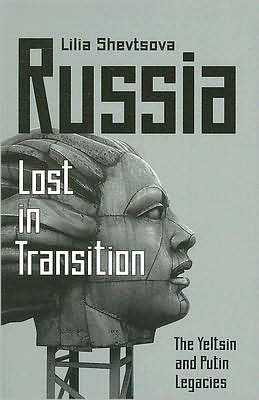A prophetic Romanian novel about a town at the mouth of the Danube carries a warning: Europe decays when it stops looking outward. In a world of increasing insularity, the EU should heed its warning.
Thomas de Waal

Lilia Shevtsova searches the histories of the Yeltsin and Putin regimes, exploring within them conventional truths and myths about Russia, paradoxes of Russian political development, and Russia’s role in the world.
Source: Washington

As Russia is in the news, startling the international community with its assertiveness and facing both parliamentary and presidential elections, Lilia Shevtsova searches the histories of the Yeltsin and Putin regimes, exploring within them conventional truths and myths about Russia, paradoxes of Russian political development, and Russia’s role in the world. Russia—Lost in Transition discovers a logic of government in Russia— a political regime and the type of capitalism that were formulated over the course of the Yeltsin and Putin presidencies and will continue to dominate Russia’s trajectory in the near-term.
Looking forward as well as back, Shevtsova speculates about the upcoming elections, the self-perpetuating system in place—the legacies of Yeltsin and Putin—and how it will dictate the immediate political future, and explores several scenarios for Russia’s future over the next decade.
Lilia Shevtsova chairs the Russian Domestic Politics and Political Institutions Program at the Carnegie Endowment for International Peace, dividing her time between the Carnegie office in Washington, D.C. and the Carnegie Moscow Center.
“A serious contribution to the understanding of Russia’s transition throughout the last two decades. Highly recommended to all who deliberate on Russia’s future.”
—Mikhail Gorbachev, former president of the Soviet Union, Nobel Peace Prize winner, and president of the Gorbachev Foundation
"One could ask for no better guides than Trenin ... combine extraordinary intellectual sophistication and an ability to think outside their national skins with hardheaded realism—analytic skills applied equally well to Western policies toward their country."
—Robert Legvold, Foreign Affairs
“With Russia—in Lilia Shevtsova’s words—moving both forwards and backwards at the same time, and once again emerging as an actor on the international stage, the need to understand the nature of the uncertain policies of the country is indeed urgent. With a regime of personalized power, the present phase of transition to a new president is obviously of key importance. Lilia Shevtsova has previously given us invaluable guides to the Yeltsin and Putin periods, and her thoughts and analysis now give us new help in understanding a country we simply have to understand.”
—Carl Bildt, minister for foreign affairs, and former prime minister, Sweden
“Once again, Lilia Shevtsova has proved herself to be a unique source of wisdom about what is happening in Russia—and why it is happening, and why it matters so much to all of us. In this, her most comprehensive book to date, her insights into the Yeltsin and Putin years range from the political dynamics of the leadership, to the paradox—and vulnerabilities—of “bureaucratic capitalism,” to the Kremlin’s domestication of the oligarchs, to the resurgence of feistiness in Russian foreign policy. An indispensable, timely and compelling contribution on what is still, though in new and unpredictable ways, one of the most important countries on earth.”
—Strobe Talbott, president, The Brookings Institution
Carnegie does not take institutional positions on public policy issues; the views represented herein are those of the author(s) and do not necessarily reflect the views of Carnegie, its staff, or its trustees.
A prophetic Romanian novel about a town at the mouth of the Danube carries a warning: Europe decays when it stops looking outward. In a world of increasing insularity, the EU should heed its warning.

Thomas de Waal
For a real example of political forces engaged in the militarization of society, the Russian leadership might consider looking closer to home.

James D.J. Brown
Washington and New Delhi should be proud of their putative deal. But international politics isn’t the domain of unicorns and leprechauns, and collateral damage can’t simply be wished away.

Evan A. Feigenbaum
Senior climate, finance, and mobility experts discuss how the Fund for Responding to Loss and Damage could unlock financing for climate mobility.

Alejandro Martin Rodriguez
The EU lacks leadership and strategic planning in the South Caucasus, while the United States is leading the charge. To secure its geopolitical interests, Brussels must invest in new connectivity for the region.

Zaur Shiriyev